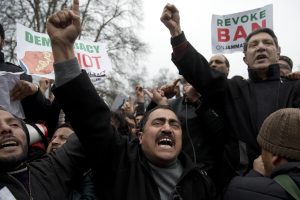In a significant development, the Jamaat-e-Islami, which hasn’t contested any election in Jammu and Kashmir (J&K) since 1987, is fielding independent candidates in the upcoming assembly elections in the Indian union territory.
A pro-Pakistan socio-religious group, the Jamaat was banned by the Indian government under the Unlawful Activities (Prevention) Act, 1967, on February 28. 2019, weeks after the suicide attack on an Indian paramilitary convoy at Pulwama that killed 40 personnel, for “indulging in activities which are prejudicial to internal security and public order, and have the potential of disrupting the unity and integrity of the country.” It was declared an “unlawful association,” for being in “close touch with militant outfits” and supporting “extremism and militancy in Jammu and Kashmir.”
The ban on the group was extended earlier this year for another five years.
Voting in the elections for a 90-member assembly will take place on September 18, September 25, and October 1. These elections are significant for several reasons. The last assembly election in J&K was held in 2014, and elections to a new assembly are long overdue. Besides, this is the first assembly election in J&K since New Delhi revoked its autonomy and downgraded its status from a state to a union territory in August 2019. In April-May this year, J&K voted in parliamentary elections with the rest of India.
The Jamaat’s participation, albeit indirectly — it is backing independent candidates — will add to the assembly elections’ significance.
The Jamaat is believed to be the ideological mentor of the Hizbul Mujahideen, the largest indigenous militant group in the Kashmir valley, the epicenter of the anti-India militancy that erupted in 1989 and raged for decades. Not only did the Jamaat stay away from elections for the past 37 years, but also it was at the forefront of election boycott campaigns in this period.
Interestingly, while it called for boycott of elections, it extended clandestine support to some candidates.
The Jamaat’s participation in the upcoming assembly election marks a shift in its political strategy.
As Rekha Chowdhary, a former professor of Political Science at the University of Jammu, observed in a recent article in Kashmir Times, “The Jamaat’s decision to participate in electoral politics is a reflection of radical change in its political position. From being active in separatist politics and shunning democratic politics – it is a great leap towards mainstream electoral politics.”
A former Jamaat leader who spoke to The Diplomat on condition of anonymity disagreed that the party’s backing of candidates reflects a shift in Jamaat’s strategy. “We have contested in elections to parliament and the assembly since the 1950s,” he said, stressing that it was only after the “sham elections of 1987, which saw rampant and open rigging and other irregularities that the Jamaat decided to stay away from India’s elections.”
The rigging of the 1987 elections turned the valley away from ballot box politics and prompted thousands of Kashmiri youth to pick up arms against the Indian state.
Through the 1990s, the Jamaat had a close relationship with the Hizbul Mujahideen and was a key component of the All Party Hurriyat Conference, an umbrella grouping of separatist organizations. In 1998, it distanced itself from militancy but remained a strong proponent of Kashmiri separatism and of Kashmir becoming a part of Pakistan.
The former Jamaat leader said that the organization’s “social service” — it runs a network of schools and orphanages — has helped it build a strong support base among the people.
This has also contributed to its capacity to mobilize crowds for protests. Indeed, the Jamaat was the force behind the stone-pelting protests that shook J&K from 2008 onwards.
The Jamaat’s decision to engage in elections did not come overnight. The realization that engagement in mainstream politics was needed prompted some leaders in the organization to push for a change in tactics over a decade ago.
But New Delhi’s increasingly muscular approach to Kashmir made this difficult. With the Modi government holding long overdue elections in J&K, scope for political activity has opened up.
In the run-up to the general elections, Jamaat leaders were reportedly engaged in talks with New Delhi. The Jamaat wanted the ban on the organization to be lifted. The government insisted that they must participate in the elections.
As “a gesture of goodwill, the Jamaat not only refrained from calling for a boycott of the general elections but also its activists voted,” the former Jamaat leader said. However, the Modi government “backtracked” on lifting the ban on Jamaat, as it is “apprehensive that Jamaat candidates would win in large numbers,” he said.
Will Jamaat-backed candidates win in the assembly elections? It is a much-weakened organization. In recent years, the government has arrested scores of Jamaat leaders and activists. Following the ban, many have gone underground. Jamaat assets were frozen in the name of cracking down on the hawala transactions that its leaders were allegedly engaging in.
Despite its street power, the Jamaat’s performance in elections has not been impressive. Its best performance was in the 1972 assembly elections when it won five seats. This was largely because the Plebiscite Front had been banned and the Jamaat enjoyed the patronage of the then-Congress government in New Delhi.
Of the constituencies that will vote in the first phase on September 18, the Jamaat is backing four independents in Kulgam, Pulwama, Devsar, and Zainapora. South Kashmir is the stronghold of the People’s Democratic Party (PDP). The PDP had benefited from the Jamaat’s support in the past, earning it the tag of being a soft-separatist party. The possibility of PDP support for the Jamaat proxies cannot be ruled out.

































